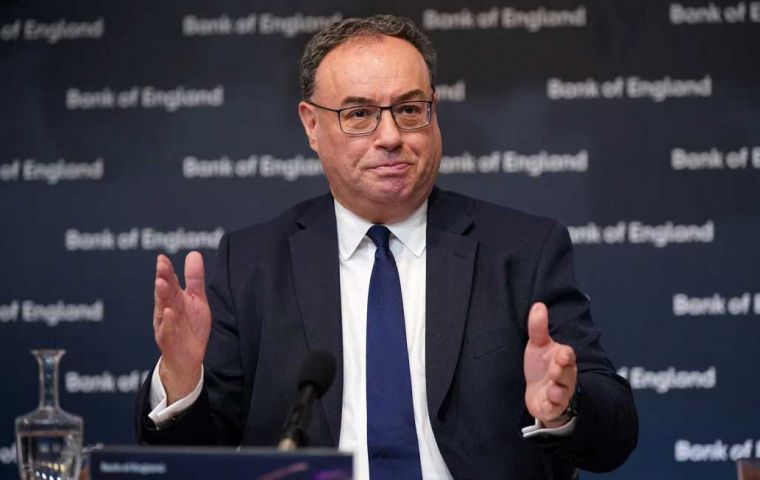MercoPress. South Atlantic News Agency
BoE cuts rate to 4.50% but slashed UK growth to 0.75% and ups inflation estimate to 3.5%
 Governor Andrew Bailey mentioned on his press conference on the influence of natural gas prices, which have risen in response to a spell of colder weather
Governor Andrew Bailey mentioned on his press conference on the influence of natural gas prices, which have risen in response to a spell of colder weather  Chancellor of the Exchequer Rachel Reeves said the rate cut was “welcome news” but admitted concern at the growth forecasts
Chancellor of the Exchequer Rachel Reeves said the rate cut was “welcome news” but admitted concern at the growth forecasts The Bank of England last Thursday cut interest rates 25 percentage points to 4,50%, but at the same time slashed its growth forecast for the year and warned the near-term outlook for the economy had become complicated.
It also held out the prospect of further cuts this year, but warned that a “gradual and careful approach” was necessary, given that a rise in winter natural gas prices has given fresh impetus to inflation.
The bank also halved its estimate for U.K. growth in 2025 to 0.75%. At the same time, it acknowledged that inflation will stay considerably above target for the whole of the year, expecting inflation to average 3.5% in 2025, up from its previous estimate of 2.75%.
Chancellor of the Exchequer Rachel Reeves said the rate cut was “welcome news” but admitted concern at the growth forecasts. Her opposite Tory number Mel Stride, meanwhile, said that the forecasts, which he called a consequence of Reeves’s “disastrous budget”, would require the Bank to go slower in cutting rates.
Reeves has had a rocky start as chancellor: growth already stalled in the third quarter of last year and figures due out next week are expected to show a second straight quarter of stagnation, reflecting the impact of her budget that announced large tax increases but failed to cut government borrowing.
In financial markets the pound fell by more than 1% as traders zoomed in on the detail that two members of the nine-strong Monetary Policy Committee had voted for a more aggressive half-point cut in the Bank Rate to 4.25%. One of the dissenters as Catherine Mann, who had until now argued for the Bank to err on the side of caution in easing policy.
The Bank said inflation is following a “bumpy path,” and Governor Andrew Bailey dwelt at some length on his press conference on the influence of natural gas prices, which have risen in recent weeks in response to a prolonged spell of colder-than-expected weather across much of Europe. He also flagged the looming rise in household water bills.
For some in the markets, it was another depressing reminder of the BoE’s habitual tolerance of inflation and a herald of ‘stagflation’, the dreaded combination of rising prices and zero growth.
“When it comes to choosing between growth and inflation, some central banks will do anything to prevent a recession,” said Alberto Gallo, chief investment officer at Andromeda Capital, via X. “The official narrative is ‘gradual’ cuts, but in practice, the BoE is sacrificing the pound and its own inflation target to keep its economy afloat.”
Bailey pushed back against such suggestions, arguing that the rise in energy prices won’t percolate through the rest of the economy as they did in 2022.
“Behind this uptick in headline inflation stands a continued gradual easing of underlying inflationary pressures,” Bailey said. The Bank still forecasts that inflation will return to its 2 percent target in the medium term.
Additionally, Bailey and Deputy Governor Dave Ramsden stressed that while the Bank had cut its growth forecast for this year, it had left its forecasts for 2026 and 2027 unchanged. They expect growth to start picking up again in the second half of this year.




Top Comments
Disclaimer & comment rulesCommenting for this story is now closed.
If you have a Facebook account, become a fan and comment on our Facebook Page!